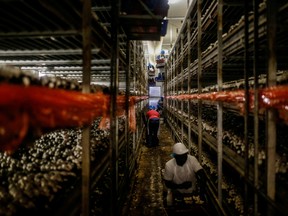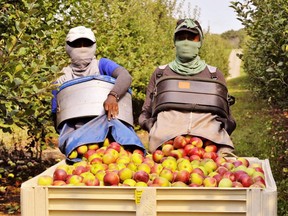Labour advocates blame job vacancies in the sector on poor conditions and wages

Article content
About 130 people called in sick one day last week to a chicken plant in Brampton, Ont., northwest of Toronto. They represented about 10 per cent of the factory’s staff, all of them either ill with the Omicron variant, quarantining or staying home with an out-of-school child.
Advertisement
This advertisement has not loaded yet, but your article continues below.
Article content
Maple Lodge Farms, a major Ontario chicken processor, had to shift people around to make sure critical jobs, particularly slaughtering, were done. The shuffle meant fewer people were on the line to do the “value-added” tasks, such as the cutting and trimming that turns a chicken carcass into a collection of more expensive products, chief executive Michael Burrows said in an interview.
“You may not be able to do a boneless, skinless thigh,” he said. “You’re looking at overtime. But candidly, you’ve got to be careful. You’re burning out your people. It’s already a demanding job and now you’re asking them to put in more time.”
The latest wave of COVID-19 infections has exacerbated a chronic labour shortage in food manufacturing reportedly hovering around 15 to 20 per cent of total positions, due in part to an aging workforce.
Advertisement
This advertisement has not loaded yet, but your article continues below.
Article content
In response, a coalition of lobby groups representing the sector has banded together to push the federal government to approve an emergency expansion of the Temporary Foreign Worker (TFW) program to bridge the labour gap in the short term.
“I can’t tell you the number of stories I’m hearing from companies who have their mothers, their spouses, their children now working in the plant” because no one else is available, said Kathleen Sullivan, chief executive of Food and Beverage Canada, which is one of the 10 trade associations behind the proposal for expanded access to temporary foreign workers (TFWs). “The situation is very dire.”
The situation is very dire
Kathleen Sullivan
The group’s proposed Emergency Foreign Worker Program , submitted in December, calls on Ottawa to expedite applications and increase the cap on the number of TFWs that employers can hire to fill low-wage positions.
Advertisement
This advertisement has not loaded yet, but your article continues below.
Article content
The cap would increase to 30 per cent of an employer’s workforce for 18 months, instead of the 10 per cent that most employers must comply with, though some long-time users of the program have a ceiling of 20 per cent.
Food and Beverage Canada said the industry is currently using about 24,000 TFWs, or less than 10 per cent of the total workforce.
“We’ve lost employees through COVID and we’re not expecting to get them back,” Sullivan said. “There are so many options now out there for people to get jobs where they can work from home.”
Job vacancies are at an all-time high in Canada with a record-setting vacancy rate of 5.4 per cent across the economy and 912,600 empty jobs in the third quarter of 2021, according to a December report from Statistics Canada.
Advertisement
This advertisement has not loaded yet, but your article continues below.
Article content
Food manufacturing was among the more heavily impacted sectors, with a vacancy rate of six per cent, though that’s not as bad as the restaurant sector’s 12.9 per cent.
Labour advocates blame the job vacancies in the food sector on poor conditions and wages, and warn that bringing in more migrants will relieve pressure on companies to improve both.
Syed Hussan, executive director of the Migrant Workers Alliance for Change, said employers in Canada have been “using any crisis” to peel back restrictions on the TFW program.

“These are not new demands, they’re just sort of being repackaged,” he said.
The proposed emergency program also includes a recommendation to provide a pathway to permanent residency for workers in food processing. TFWs have reported they have no choice but to endure jobs with safety hazards or poor living conditions because, without permanent residency, they would be forced to leave the country if they quit or were fired for speaking out.
Advertisement
This advertisement has not loaded yet, but your article continues below.
Article content
But Hussan said pathways that would allow TFWs to become permanent residents over time is “a two-step process where step one is indentureship.” The federal government should offer permanent residency on arrival in Canada if it agrees that foreign workers are needed to plug gaps in the food system, he said.
The coalition argues the emergency expansion is only half of its plan. The second part is an 18-month project to develop a strategy for addressing job vacancies in the sector, in partnership with the Canadian Federation of Agriculture.
“The situation is unsustainable, and whatever we’ve been doing hasn’t been working,” Sullivan said. “In the meantime, I don’t think as a country we can afford to have a food system that doesn’t have the right number of people working in it because that simply results in less food.”
Advertisement
This advertisement has not loaded yet, but your article continues below.
Article content
Wages are “something we need to look at,” Sullivan said, but added that further study may find wages are competitive. The average hourly wage for vacant positions in food manufacturing was $18.70 in the third quarter, Statistics Canada reported. Overall average wages in the sector were $21.76 per hour as of 2018, according to Food Processing Skills Canada, a workforce development non-profit.
The federal government has already announced plans to tackle the labour crisis in the food sector, including a Trusted Employer program that would streamline the application process for bringing in TFWs.
Prime Minister Justin Trudeau told Agriculture Minister Marie-Claude Bibeau in her mandate letter late last year that fixing the “persistent and chronic labour shortages” in agriculture and food processing was an “immediate priority.”
Advertisement
This advertisement has not loaded yet, but your article continues below.
Article content
Paying more won’t solve the issue. It does not create people. It does not create workers
Daniel Vielfaure
On Monday, an agreement between Ottawa and Quebec boosted the cap on low-wage TFWs in the province to 20 per cent from 10 per cent in several sectors, including food manufacturing, hospitality, forestry, tobacco and rubber.
Throughout the pandemic, deadly outbreaks among migrant workers on farms have drawn public attention to poor living conditions. In a report published in December, auditor general Karen Hogan found problems with 88 per cent of last year’s federal inspections into whether farms were compliant with health measures aimed at protecting TFWs from the virus.
United Food and Commercial Workers Canada, a union, said the agriculture industry’s “over-reliance” on TFWs has led to the issues that came to light during the pandemic.
Advertisement
This advertisement has not loaded yet, but your article continues below.
Article content
“This hasn’t crept up on the country,” said Derek Johnstone, the union’s spokesperson. “We’ve known about the labour-market challenges in agri-food for decades.”
Bonduelle Long Life America, a subsidiary of French frozen-foods giant Bonduelle SA that operates eight canning and freezing plants in Canada, has been trying to increase staffing with bonuses and wage increases. But recruitment can be tough because the plants are in sparsely populated rural areas and most of the jobs are seasonal, between June and November, when crops are harvested.
-

Manufacturers fear Omicron wave could exacerbate staff shortages
-

Burning Questions: When will my grocery bill stop spiralling?
-

Tim Hortons expects labour shortage to ease as feds roll up aid for workers
-

‘Something’s got to give’: Restaurants slash hours, trim menus as worst worker shortage ever cuts deep
Advertisement
This advertisement has not loaded yet, but your article continues below.
Article content
Daniel Vielfaure, who oversees Bonduelle’s operations in North America and Brazil, said his Canadian plants have in some cases increased salaries by 25 per cent compared with three years ago, but the raises only keep his current employees from jumping to competitors.
“Honestly, it’s just impossible to find Canadians to do those jobs anymore,” he said. “If you have five jobs that are on the market and you have three people, paying more won’t create two employees.”
Food producers complain they aren’t able to take on extra operational costs because Canada’s dominant grocery chains often refuse to accept price increases.
Vielfaure said Bonduelle produces private-label products for Canadian grocery store brands, so he’s in constant competition with frozen peas and beans from other countries, such as China.
“If they find cheaper products somewhere, they will take it,” he said. “So there’s a limit to what you can pay. And paying more won’t solve the issue. It does not create people. It does not create workers.”
Financial Post
• Email: jedmiston@postmedia.com | Twitter: jakeedmiston
Advertisement
This advertisement has not loaded yet, but your article continues below.


